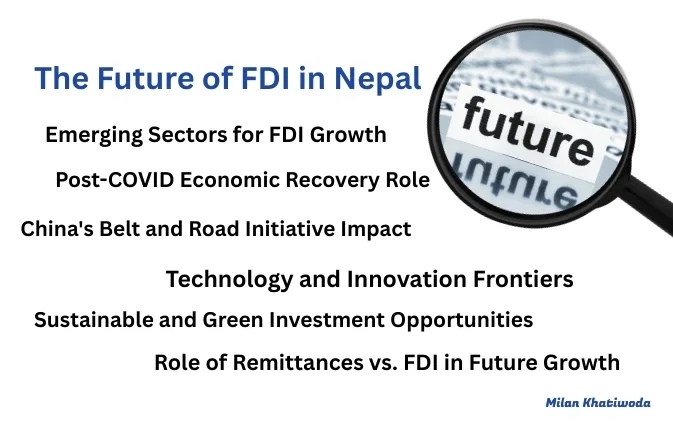How FDI Can Impact Business Growth in Nepal 2025?
How FDI Can Impact Business Growth in Nepal 2025?
Foreign Direct Investment (FDI) means when a company or individual from another country invests money into businesses or projects in Nepal. This brings important resources like money (capital), new technology, specialized knowledge (expertise), and connections to global markets.
These investments help Nepal's economy grow by creating jobs, supporting new businesses, transferring modern technology, and expanding important industries such as hydropower, information technology, tourism, and agriculture. Essentially, FDI helps Nepal develop its businesses and economy faster and more effectively.
Foreign Direct Investment (FDI) can impact Nepal’s economic growth and business expansion from boosting GDP to supporting entrepreneurship development. The impact of FDI in business growth is becoming more significant in 2025. Nepal's economy showed signs of recovery and transition, with a real GDP growth rate of 4.9% in the first half of FY 2025.
Foreign Direct Investment (FDI) in Nepal provides economic development by giving much-needed capital, technology, and knowledge to its sectors. Nepal received roughly $65.46 million in FDI in 2022, which climbed to almost $70 million in 2023, indicating improving investor confidence in the face of global concerns.
As a business consultant in Nepal, I've seen how foreign direct investment (FDI) supports technology transfer, talent development, and market expansion. This inflow is helping to change Nepal's business landscape.
This blog will explore how FDI influences business growth across Nepal’s key sectors, highlight recent trends and challenges, and offer insights for local entrepreneurs and foreign investors aiming to leverage these opportunities.
Why FDI Matters for Nepal’s Economic Development?
FDI is critical to Nepal's continued economic progress since it boosts GDP, creates jobs, and improves the trade balance. Because domestic savings and investments are limited, FDI provides critical capital and contemporary technologies, increasing productivity and development.
According to the World Bank and Asian Development Bank, large FDI inflows help Nepal thrive by addressing capital and technological gaps. Foreign investment produces jobs, particularly in critical sectors like hydropower, information technology, and tourism, allowing Nepal to lessen its dependency on imports while growing exports.
The Nepal Rastra Bank asserts that foreign direct investment fosters growth in numerous allied industries in addition to increasing GDP. All things considered, Nepal's problems with limited capital, technological shortcomings, and the need for market diversity are addressed by foreign direct investment, which has a multiplier impact that helps the entire economy.
Understanding FDI: Concept and Types

in Nepal involves long-term investments by foreign companies that take a lasting interest in local businesses.
This can happen in different ways like equity investments where foreign firms buy shares in Nepalese companies, joint ventures where they partner with local businesses, technology transfer agreements that bring new skills and know-how, and reinvestment of earnings by existing foreign investors showing confidence in Nepal’s future.
The Upper Tamakoshi Hydropower Project is one of the biggest and most significant hydropower projects in Nepal. It is a prime example of foreign investment in the country. These investments bring in money and cutting-edge technology to support the growth of important industries like hydropower, IT, and tourism.
The Foreign Investment and Technology Transfer Act (FITTA) has been amended lately to facilitate investor access and increase opportunities in a number of areas, is the primary tool used by Nepal to control foreign investments.
Greenfield vs Brownfield Investments
Greenfield investments in Nepal involve building completely new projects, such as hydropower plants or manufacturing facilities, from the ground up. These require larger initial capital but allow investors full control and the ability to design operations to fit their goals.
For example, the Upper Trishuli-1 Hydropower Project is a major greenfield investment, where foreign investors helped build a new 216 MW run-of-the-river plant to increase Nepal’s electricity supply.
Brownfield investments, on the other hand, occur when foreign businesses buy out or partner with Nepalese businesses that are already established. This facilitates faster market entry by leveraging pre-existing infrastructure, although operational integration may provide challenges.
Example: Large hotel chains regularly purchase minor hotels in Nepal's tourism sector and remodel them to meet international standards for service.
Horizontal, Vertical, and Conglomerate FDI
- Horizontal FDI happens when foreign companies set up similar businesses in Nepal as they have in their home countries.
- Vertical FDI occurs when foreign firms invest in different parts of their supply chain within Nepal, such as a textile company investing in cotton processing.
- Conglomerate FDI involves foreign investors entering entirely different business sectors, which is less common but helps spread risk.
Recommended Read: Business Ideas In Nepal
Current Landscape of FDI in Nepal
Nepal sees a gap between approved FDI commitments and actual inflows, a common challenge in developing economies. While commitments have surged, actual inflow often falls short due to bureaucratic delays, infrastructure deficits, and policy instability.
Approved vs Actual FDI Inflows
One of the biggest challenges in Nepal's FDI landscape is the large gap between approved foreign investments and the actual money that comes into the country. Although the Department of Industry approves billions of rupees in foreign investment proposals every year, only a small portion of these investments are realized.
This gap is due to several reasons, including complicated government procedures, infrastructure problems, and changing market conditions. From my consulting experience, this gap often appears because investors are optimistic during the approval phase but face practical difficulties when starting their projects.
Complex bureaucratic steps, unexpected regulatory obstacles, and poor infrastructure often delay or discourage investors from fully deploying their capital. Addressing these issues is critical for Nepal to convert more approved investments into real economic growth.
Sector-wise Distribution of FDI
In Nepal, the largest industry drawing foreign direct investment (FDI) is hydropower, which is followed by the IT, tourism, manufacturing, and agricultural sectors. This indicates promising prospects for international investors, particularly in light of expanding markets and government incentives.
| Sector | FDI Share (%) | Key Characteristics |
| Hydropower | 45-50% | Large-scale projects, long gestation periods |
| Manufacturing | 20-25% | Diverse sub-sectors, export potential |
| Tourism & Hospitality | 10-15% | Service-oriented, seasonal variations |
| Information Technology | 5-10% | Growing rapidly, skill-intensive |
| Agriculture & Agro-processing | 3-8% | Emerging opportunities, value addition |
| Other Services | 5-10% | Financial services, education, healthcare |
FDI Inflows and GDP Growth %: Recent Trends
Foreign Direct Investment (FDI) has increased industrial production and created jobs. Nepal's overall foreign direct investment (FDI) value increased by 11.8% to Rs295.5 billion in 2023, primarily from China and India.
The country gets investments largely from India, China, the UK, and the Middle East, diversifying sources and industries. Despite strong FDI approvals, only 30-50% of approved investments have materialized, there is need for improved project execution and investment facilitation to close the gap between pledged and actual inflows.
Government Policies and FITTA Regulations
The Foreign Investment and Technology Transfer Act (FITTA) 2019 is the main law that guides foreign investment in Nepal. It sets clear rules about which sectors are open for foreign investors and how investment approvals are handled. Recent changes to FITTA have expanded the sectors where foreign investment is allowed, showing the government’s commitment to encouraging more FDI.
Nepal allows foreign investment in areas like manufacturing, services, tourism, construction, agriculture, minerals, and energy. Some sectors allow full foreign ownership, while others require partnerships with local businesses to protect national interests.
The government offers incentives such as tax breaks, faster approval processes, and easy profit transfer to attract investors. One-window services have been introduced to simplify procedures, and efforts are ongoing to digitize approvals and create special incentives for different industries. Nepal also supports joint ventures by combining foreign capital with local knowledge for better business success.
As a professional Business Consultant of Nepal, I can assist you in your investment without any hassle.
Comparative Analysis: Nepal vs Regional Economies

Nepal’s FDI/GDP ratio remains low compared to neighbors like India and Bangladesh, There is always a room for improvement.
Nepal’s FDI Performance in South Asia Context
While countries like Bangladesh and Vietnam have used foreign investment to transform their economies significantly, Nepal’s FDI inflows are still quite low relative to its GDP and population size. FDI inflows in Nepal usually range from 0.1% to 0.4% of GDP, which is much lower than regional averages.
This means there is a lot of untapped potential for Nepal to grow. For example, Bangladesh attracts 0.5% to 1.0% of GDP in FDI, and Vietnam reached 2% to 4% during its peak growth. This shows Nepal has space to improve and attract more foreign investment to boost its economic development.
Policy Framework Comparison
Nepal’s investment promotion strategies are improving but still lack the strong coordination seen in regional neighbors like Vietnam and Bangladesh. While the Foreign Investment and Technology Transfer Act (FITTA) provides a basic legal framework, other countries have developed more advanced systems with dedicated agencies that actively promote investments and have international reach.
Nepal offers competitive incentives in certain sectors but lacks the focused strategy and efficient implementation found in those economies. Also, Nepal faces bureaucratic delays and infrastructure gaps, which discourage some investors from promising opportunities.
Learning from Regional Success Models
The textile and manufacturing success of Bangladesh demonstrates that concentrating on important industries can draw in more foreign investment. Vietnam drew significant international investment to establish industry geared toward exports, which revolutionized its economy.
India's rise in IT services demonstrates how industries with a high level of talent can gain a competitive advantage. Similar worldwide promotion and assistance could serve as a model for Nepal's industrial growth plan.
Recommended Read: How To Close Company in Nepal?
The Role of FDI in Driving Business Growth
FDI is essential to Nepal's corporate development since it brings in money, new technology, and management expertise. By introducing contemporary procedures, raising quality standards, and providing access to global markets, it benefits local companies.
FDI bridges the gap left by Nepal's banks' inability to supply sufficient long-term funding for large projects, allowing companies to grow and modernize. FDI generates a large number of indirect jobs in auxiliary industries in addition to direct jobs in businesses that receive foreign investment.
Over time, technology transfer from international businesses boosts Nepal's competitiveness by fostering the development of indigenous expertise and skills. In general, foreign direct investment (FDI) promotes innovation, entrepreneurship, and sustained economic growth in addition to providing financial resources.
Role of FDI in Entrepreneurship Development
Foreign investment encourages entrepreneurship in Nepal by supporting profitable business concepts, generating demand for local suppliers, and offering local entrepreneurs guidance.
Many successful Nepalese company owners have gained substantial experience working for foreign-invested companies prior to starting their own ventures.
Through the introduction of improved business practices, access to global markets, and the linking of local startups with international networks, foreign direct investment (FDI) enhances the ecosystem of entrepreneurship.
In addition to providing vital early-stage support and market validation, foreign investors frequently act as important clients or partners.
Impact of FDI in Nepal
Each major industry in Nepal experiences varying degrees and kinds of foreign investment influence, resulting in a highly variable sectoral impact of FDI. Businesses thinking about international alliances and investors assessing prospects must have a thorough understanding of these sectoral dynamics.
Hydropower: Nepal’s Biggest FDI Magnet
Leading hydroelectric projects such as the Upper Tamakoshi Hydroelectric Project (456 MW) make Nepal's hydropower industry the most notable success story for foreign direct investment (FDI).
With the help of global investors like the Asian Development Bank, these initiatives provide access to export markets, cutting-edge technology, and project management know-how. During construction and operation, hydropower investments create a significant number of jobs, which promotes rural development.
The success of Upper Tamakoshi has spurred further foreign investment, enhanced local capabilities in project development and operation, and positioned Nepal as an emerging regional hub for hydropower development. This combination of foreign and domestic financing and expertise continues to drive growth in this vital sector.
Information Technology and Startups
Nepal's IT sector has experienced remarkable growth partly driven by foreign investment in outsourcing ventures and fintech startups. Foreign investors have recognized Nepal's educated workforce, cost advantages, and improving digital infrastructure as compelling value propositions for technology services and software development.
The startup ecosystem benefits from foreign venture capital and angel investment that provides both funding and mentorship for emerging technology companies. International investors bring not only capital but also expertise in regulatory compliance, product development, and market expansion that local startups often lack.
Tourism and Hospitality Growth
Foreign investment has played a major role in enabling Nepal to upgrade its tourism infrastructure while preserving its cultural identity. Foreign-owned hotels and hiking firms have created jobs, international service standards, and support for local suppliers.
Their extensive distribution networks and global marketing capabilities enable these investors to become more visible in the global tourist business, which benefits the ecosystem as a whole. Increased global awareness, cultural preservation, and the expansion of locally produced tourism-related goods and services are all benefits of foreign investment in the travel and tourist sector.
Agriculture and Agro-Processing
Because of the value addition brought about by export markets, particularly for tea, coffee, and herbal items, foreign investment is revolutionizing Nepal's conventional agricultural industry.
Agro-processing FDI promotes rural development and helps small farmers boost their output and earnings by providing markets and technical assistance. There is still a lot of untapped potential in the industry, including excellent opportunities in organic farming, spice processing, and specialty crops that fetch high prices overseas.
Manufacturing and Construction
Textiles, food processing, and light industrial goods are the main industries receiving foreign investment in Nepal's manufacturing sector. These investors assist local businesses compete on a global scale by providing access to export markets, quality control, and contemporary production techniques.
Large infrastructure projects frequently use international contractors who also impart skills to local workers, thanks to foreign investment in the construction industry, which has raised building standards and brought new technologies. Although total investment is still low in relation to the sector's potential, both sectors gain from technology transfer that improves local capabilities.
Small Business Growth Powered by FDI
Small and medium enterprises (SMEs) in Nepal particularly benefit from FDI:
- They gain access to international markets and new customer bases.
- Adoption of modern technology improves their operations and product quality.
- IT startups, for example, gain mentorship, funding, and global exposure through partnerships with foreign investors.
- Seasonal industries like tourism use FDI to stay cash-positive during off-peak periods.
- With foreign capital, SMEs can scale their operations and compete at the regional and international level.
Through strategic foreign investments, Nepal’s SMEs are becoming more resilient, innovative, and globally connected, strengthening the country’s overall business ecosystem.
Challenges of FDI in Nepal

Difficult bureaucracy, inconsistent policies, poor infrastructure, currency risks, a small local market, and political instability are just a few of the major obstacles faced by foreign investors in Nepal. These challemges cause delays in project implementation.
Infrastructure Limitations
The physical infrastructure of Nepal is one of the main obstacles to foreign investment in the nation. Unstable electricity affects quality and disrupts manufacturing. Inadequate transportation, especially outside of Kathmandu, limits access and raises logistics costs.
Despite advancements in internet access, issues with reliability and capacity limit investments in the IT and service sectors. Due to the increased costs and uncertainty caused by these discrepancies, Nepal finds it more challenging to attract substantial international investment. Resolving Nepal's infrastructure constraints is necessary to unlock its investment potential.
Currency Risk and Repatriation of Profits
For investors to have faith in Nepal, foreign exchange availability and currency stability are essential. Even though Nepal Rastra Bank typically keeps exchange rates stable, sporadic shortages of foreign currency can cause anxiety, particularly for significant projects that depend on imports or profit repatriation.
Although legally simple, profit repatriation may be delayed because of foreign exchange restrictions. Due to a lack of choices for managing currency risk, investors in Nepal's financial markets are forced to take on greater risk or use alternate hedging techniques.
Regulatory and Policy Constraints
Complex and sometimes inconsistent regulatory procedures create uncertainty and delays for foreign investors. While FITTA provides the primary framework, investors often must navigate multiple agencies and approval processes that lack coordination and clear timelines.
Policy instability and frequent changes in regulations or implementation procedures increase compliance costs and business planning difficulties. Foreign investors particularly value regulatory predictability and consistency in policy implementation.
Bureaucratic inefficiencies and lack of clear single-point contact for investors compound regulatory challenges. Despite one-window policy initiatives, investors often report significant time and effort required to complete approval and licensing procedures.
Market Size and Access Limitations
Due to Nepal's limited domestic market, significant manufacturing and service investments must be made with an eye toward exports from the outset. Due to complicated border and transit procedures, geographic remoteness and reliance on nearby trade routes present additional difficulties that result in delays and increased expenses.
Businesses must modify their product offers and price due to the limited purchasing power of consumers. In order to overcome market barriers, these considerations emphasize the necessity of export-oriented strategy and effective trade facilitation.
Human Capital and Skills Gap
Although Nepal's highly educated populace attracts global investors, training expenditures are necessary due to a lack of certain technical capabilities. A problem with brain drain is that many highly qualified workers depart for greater opportunities elsewhere, which results in a labor shortage.
Communication problems can arise due to language and cultural differences, although Nepal's multilingual education and cultural adaptability usually make doing business internationally easier. Improving Nepal's appeal as an investment destination requires addressing training and retention.
Political and Economic Stability Concerns
Nepal's political upheavals and ambiguous policies make long-term investment planning and implementation difficult. Despite the improvement of democratic institutions, investors are nevertheless wary because of the possibility of policy changes brought about by changing governments.
Despite being largely beneficial, economic stability is susceptible to outside shocks such as natural catastrophes, changes in commodity prices, and regional patterns. An additional source of unpredictability is the dependence on border trade and regional geopolitical concerns.
These elements emphasize how important it is to have stable, predictable policies in order to create an environment that is conducive to investment and draw in consistent foreign capital.
Sustainability and Environmental Concerns
Foreign investors are required under Nepal's environmental regulations to adhere to ongoing environmental standards and environmental impact assessments (EIAs), which may differ from those of their home countries.
Investment planning is becoming more and more dependent on climate change adaptation and resilience, particularly for weather-sensitive infrastructure and agriculture.
Beyond regulatory compliance, communities' and civil society's expectations for social responsibility necessitate thorough evaluation of social impacts and engagement tactics. Fulfilling these prerequisites is crucial for long-term investment in Nepal.
Consultant’s Insights: How Businesses Can Leverage FDI

Businesses in Nepal should thoroughly prepare by bringing their financial records, legal documentation, and processes into compliance with international standards in order to optimize benefits and avoid risks in foreign investment partnerships.
Professionalism and transparency are essential when international investors carry out thorough due diligence. Joint ventures that are successful must be carefully negotiated to specify the contributions, control systems, and exit strategies of each partner while striking a balance between local networks and market knowledge and foreign cash, technology, and access to international markets.
Additionally, partners must consider the long term by striking a balance between sustainability and profitability, including regulatory compliance and positive community effect, since these aspects are becoming more and more significant to international investors looking for long-term, ethical business partnerships.
Recommended Read: What does Business Consultant Do?
Case Studies: FDI Success Stories in Nepal
The largest hydroelectric accomplishment in Nepal is the Upper Tamakoshi hydropower Project, which has a 456 MW capacity.
It serves as an example of how substantial infrastructure that strengthens the national economy may be constructed with foreign capital and technical expertise. Important international collaborators included foreign contractors, equipment suppliers, Korean organizations, and the Asian Development Bank.
Strong government backing, transparent risk sharing, and careful treatment of technical and environmental issues were crucial success factors. The initiative has enhanced local technical skills, generated jobs, and greatly increased Nepal's power supply. Its teachings place a strong emphasis on thorough planning, including stakeholders, and maintaining policy support throughout the lengthy development phase.
Hyatt Regency Kathmandu (tourism/hospitality) The Hyatt Regency Kathmandu, which blends local culture with international standards to give a unique, globally competitive experience, is an example of a successful foreign investment in Nepal's hospitality sector.
In addition to creating a significant amount of jobs, it brought in professional hotel management, marketing, and service quality. Strong staff training, a fantastic location, and strong relationships with local suppliers were all key success elements that bolstered the larger tourism ecosystem. The hotel is a wonderful example of how foreign investment can respect local traditions while raising industry standards.
Outsourcing IT companies in Kathmandu (technology/skills transfer) The IT outsourcing sector in Kathmandu is attracting global investment due to Nepal's educated workforce, economic advantages, and growing digital infrastructure. These companies provide technical support, data processing, and software development to clients worldwide while also creating high-value jobs for Nepalese professionals.
The technology and talent transfer from these investments have strengthened Nepal's IT sector and encouraged more foreign and domestic investment and entrepreneurship. By showing how foreign direct investment (FDI) in the service sector may generate sustainable competitive advantages based on human capital, this accomplishment offers a model for diversified economic development.
Recommended Read: Private vs Public Company
Policies for Enhancing FDI and Business Growth
For Nepal to successfully draw in foreign direct investment (FDI), policies addressing infrastructural shortcomings, human capital development, regulatory efficacy, and key sector promotion must be coordinated.
The Foreign Investment and Technology Transfer Act (FITTA) 2019 and its updates have improved Nepal's FDI framework by increasing the areas available for investment and streamlining clearances. Digitizing procedures, creating empowered single-window platforms, and concentrating infrastructure development on transportation, power, and digital connection through public-private partnerships are all necessary to improve the investment climate. A competitive, alluring environment for foreign direct investment (FDI) in Nepal would be further supported by improving e-governance, sector-specific skill development, and regional trade integration.
Incentives and One-Window Policy Improvements
To guarantee actual benefits, investment incentives in Nepal should focus on industries and endeavors that have the most potential to further the country's development.
Performance-based standards such as export growth, technology transfer, and job creation should be used. Implementing a one-window strategy successfully calls for accountability, adequate resources, well-trained personnel, and technology to expedite procedures.
As economic goals change, incentive programs must be updated frequently in response to investor input and development outcomes in order to remain applicable and efficient.
Regional Trade Integration in South Asia
By providing investors with access to bigger markets and more effective supply chains, Nepal's involvement in regional trade agreements and economic integration initiatives greatly increases its attractiveness to foreign investors.
Both domestic companies and international investors gain when trade facilitation and customs procedures are made simpler. Enhancements to trade routes and cross-border infrastructure can establish Nepal as a major South Asian transit and logistics hub, attracting new foreign direct investment.
Additionally, regional cooperation in investment promotion and dispute resolution helps build investor confidence while fostering technology and knowledge sharing among South Asian economies, strengthening Nepal's overall investment climate.
Digital Transformation and E-Governance for Investors
E-governance programs and digital government services in Nepal can significantly improve the experience for foreign investors by lowering compliance costs and expediting processing times. A more competitive and investor-friendly environment is offered via online platforms for applications, digital document submission, and automated approvals.
In addition to simplifying corporate operations, digital identity and payment systems can increase transparency and reduce the likelihood of corruption two factors that are particularly significant to investors.
There is more potential for enhancing government services with emerging technologies like blockchain. In order to strike a balance between innovation, privacy, and safety, Nepal will need robust cybersecurity and data protection regulations as it continues its digital transition. Taken together, these technological developments have the potential to increase Nepal's appeal and credibility as a foreign investment destination.
The Future of FDI in Nepal: Opportunities Ahead

Emerging Sectors for FDI Growth
In addition to hydropower, Nepal presents excellent prospects for foreign investment, particularly in the fields of healthcare, pharmaceuticals, the digital economy (fintech, e-commerce, and digital services), and green energy (solar, wind, and energy storage). Investments in renewable energy are more alluring due to the nation's climate goals and access to foreign capital.
The growth of the knowledge-based industry is aided by improved connection and a trained workforce, but the opportunities for healthcare and medical tourism are increased by changing rules and local demand. These industries demonstrate Nepal's capacity to serve as a center for creative, sustained foreign direct investment.
China's Belt and Road Initiative Impact
Nepal's foreign direct investment environment has both opportunities and problems as a result of China's Belt and Road Initiative (BRI). In addition to promoting complementing foreign investments from other nations, infrastructure investments under the BRI could assist Nepal in overcoming important development barriers.
The BRI can establish Nepal as a regional transit hub by enhancing cross-border connectivity, creating new opportunities for logistics and trade companies. However, in order to maximize gains, Nepal must carefully balance its relations with China and India, preserving policy independence while utilizing the economic rivalry between these two powerful neighbors.
Post-COVID Economic Recovery Role
Nepal was severely affected by COVID. Therefore, the economic recovery took a while. However, Nepal's post-pandemic economic recovery has opened up new avenues for foreign investment, especially in the formation of strong supply chains, digital technology, and healthcare facilities.
These shifting trends could benefit Nepal as global firms want to expand their production sites. With increased interest in adventure, wellness, and eco-tourism areas where Nepal has inherent advantages the tourism industry is also recovering. Furthermore, the growth of digital nomads and remote work opens up new avenues for infrastructure and service investments facilitate flexible, location-independent employment.
When taken as a whole, these patterns make Nepal a desirable location for a variety of international investors looking to expand in developing industries.
Technology and Innovation Frontiers
Advanced technology and artificial intelligence present Nepal with intriguing prospects for foreign investment in conventional industries including manufacturing, services, and agriculture. Both money and advanced skills can be brought in by these technologies to modernize and increase productivity.
Blockchain and cryptocurrency policies are carefully developed, so it might make Nepal a financial technology leader in the region and draw in new tech investments. Partnerships between international companies and Nepalese institutions in research and development can generate knowledge-driven investments that support regional innovation and expansion.
These tech-driven opportunities have the potential to sustainably combine local strengths with global expertise to alter Nepal's economy.
Sustainable and Green Investment Opportunities
With environmental, social, and governance (ESG) investment criteria playing a bigger role in directing global capital, Nepal has an opportunity to draw in foreign investment for globally compliant sustainable development initiatives.
There are opportunities in ecologically friendly land use, carbon credit markets, forest conservation, and renewable energy, all of which can provide new revenue streams by fusing investment with environmental preservation.
For international investors with cutting-edge technology and experience, in particular, investing in waste management and circular economy solutions might help Nepal solve urban issues while generating lucrative economic prospects.
These investments with an emphasis on ESG fit in nicely with Nepal's objectives for sustainable growth and climate resilience.
Role of Remittances vs. FDI in Future Growth
Nepal has high remittance inflows. So, it might face both advantages and disadvantages in attracting foreign direct investment (FDI). Remittances boost consumption and provide required foreign currency, but they can also undermine motivation for some foreign investments by artificially maintaining domestic demand.
However, there is a great deal of opportunity for Nepalese diasporic investment, or "nostalgic FDI," which combines foreign knowledge with local commitment and experience, to grow into a substantial source of foreign finance.
Using the significant amount of wealth presently entering Nepal through migrant workers, effective laws that encourage remittances to be used toward productive investment rather than just consumption could be advantageous in addition to FDI recruitment efforts.
Recommended Read: How to Register a Business in Nepal From India?
Final Thoughts: Unlocking Nepal’s Business Potential through FDI
Foreign direct investment (FDI) in Nepal brings economic growth, capital, technology, skills, and market access. To fully benefit, Nepal must maintain stable policies, improve infrastructure, simplify regulations, and build a skilled workforce.
A balanced strategy that protects national interests and promotes sustainable development, learning from regional examples and fostering collaboration, will help Nepal attract the right investments for inclusive growth and innovation. Contact Us for more FDI insight and consultation.
FAQs on FDI and Business Growth in Nepal
Foreign Direct Investment (FDI) refers to investments made by foreign entities in businesses or assets in Nepal. It is crucial for Nepal as it brings in capital, technology, and expertise, which can significantly boost economic growth and development.
In recent years, FDI inflow in Nepal has a fluctuating trend, with some years experiencing growth while others faced declines. Factors such as political stability, regulatory changes, and global economic conditions have influenced these variations.
As of the latest reports, Nepal's GDP growth percentage is approximately 4-5%, reflecting a gradual recovery from the impacts of the COVID-19 pandemic and ongoing efforts to stimulate economic activity.
FDI contributes to employment in Nepal by creating new job opportunities in various sectors, particularly in manufacturing, services, and infrastructure. This influx of foreign investment helps reduce unemployment and improve living standards.
Policies like tax incentives, investment protection agreements, and streamlined approval processes support FDI in Nepal. The government aims to create a more favorable environment for foreign investors to encourage economic growth.

